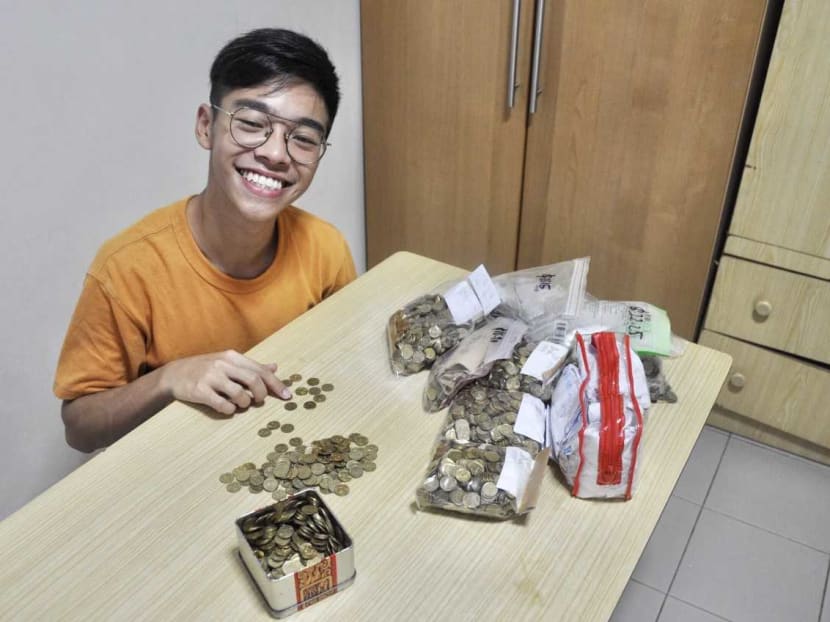Change to make change: This Singapore student collected S$700 worth of 5-cent coins to aid the needy
SINGAPORE — If you feel bothered when five-cent coins sit around in your wallet as dead weight, know that your loose change could just make a difference in someone else’s life, thanks to an initiative called the Five Cents Project.

Nanyang Technological University undergraduate Adrian Foo with a pile of five-cent coins donated to his initiative, which is raising money to buy meals for needy seniors.
SINGAPORE — If you feel bothered when five-cent coins sit around in your wallet as dead weight, know that your loose change could just make a difference in someone else’s life, thanks to an initiative called the Five Cents Project.
The project is helmed by 21-year-old undergraduate Adrian Foo, with the proceeds going towards sponsoring meals for elderly cardboard collectors here.
In just under four months, the Nanyang Technological University student has collected more than S$700 worth of five-cent coins — the 14,000 pieces weigh a hefty 20kg.
“It’s so common for people to disregard five cents because they’re deemed useless and of no value. But something of such small value, when accumulated, can really make a huge difference,” the sociology major told TODAY.
At the heart of the project is spreading the idea of contribution, that “there is really nothing too small as long as you’re willing to give”, Mr Foo added.
When he first began, he would go from place to place to meet people who were eager to contribute their five-cent pieces.
There are now five collection points around Singapore where people may drop off their five-cent coins, and more are set to come.
The locations are:
* Chippy, Plaza Singapura #B2-38
* Puri-Puri, 367 Beach Road
* Soylicious, Bukit Timah Food Centre, #02-166
* Madas Nasi Lemak, Choh Dee Place Coffeeshop, 233 Yishun Street 21
* Li Fang Congee, Kinex #B1-K9, 11 Tanjong Katong Road
“Nothing is too small. Even if you think it is, something small is still better than zero,” Mr Foo said, summing up the essence of his project.
“If everyone in Singapore just gave five cents, it would amount to S$281,935. And that’s just five cents, something most people are more than willing to give away.”
MEALS FOR SENIORS
The S$700 worth of donations, collected since March, will go to the Happy People Helping People (HPHP) Foundation, a non-profit organisation that provides free meals for seniors who are cardboard collectors.
“There’s this parallel that runs along my project and them. They work so hard to collect cardboard for a certain amount of money, but people throw that amount out so easily,” Mr Foo said.
To put it into perspective, collectors earn about 10 cents for each kilogramme of cardboard, which is “already the highest rate”.
So, in order to earn a meal for S$3, the collectors have to get 30kg of cardboard pieces, scavenging them from dumpsters and straining to transport them across busy roads.
“Do you realise how difficult that is for them? Imagine yourself at 80 years old and having to toil through the days just for one plate of rice,” he added.
Mr Nafiz Kamarudin, 37, the founder of HPHP, remarked that the project was “a brilliant idea”.
“We are very appreciative of what he did and fully support his efforts. We hope more youth would have the courage and initiative to take action when they see something not right,” Mr Nafiz said.
POWER OF SHARING
The most meaningful part about the initiative so far was how “people were so willing to contribute”, Mr Foo noted.
When he first started the project in March, it was mostly friends and family members who contributed to the pool of money.
“You could really see the community spirit. They would tell me how they amassed the coins from their own parents, schoolmates, colleagues, all of their own accord.”
Even then, when his Facebook page had only about 50 likes, strangers contacted him, eager to donate.
One of them was graphic designer Dawn Yap, 22, who met up with Mr Foo to hand him S$30 worth of five-cent coins.
“I just wanted to do what I can on my part. If I can help an elderly person have a day’s meal, I’m happy,” Miss Yap said. To accumulate the amount, she had “dug around the house” and asked friends.
“It’s very rare to see young people wanting to contribute back to the community. I hope he can spread his words and actions and inspire more kind people,” she added.
WORK IN PROGRESS
A major obstacle was converting the coins to usable money, but thankfully, a bank offered a one-time waiver of the fee for large deposits of coins, Mr Foo said. The coins were converted into a cheque, which was presented to HPHP on May 30.
He is discussing with several banks to get waivers for future conversions. If he cannot get a waiver, he will have to pay a fee, which varies from bank to bank. For instance, UOB charges S$2 for every 100 pieces deposited while POSB charges S$0.015 per coin, from the 1,001th piece onwards.
To ensure the project’s sustainability, his next step — and also the biggest hurdle — is to get his project licensed under the Charities Act, in order to enhance its reach and make it “fully legitimate”.
“Some people have raised concerns about the project’s transparency and accountability, so it’s my biggest concern at the moment to solidify its foundations,” he said.
Mr Foo is also looking into using future donations for other causes, in addition to sponsoring HPHP’s work.
“The response has been really amazing so far, and many people have offered their help to further the project. There’s still a long way to go,” he said.
“More than just the money and the cause, I hope it can be impactful enough to have people start rethinking the way they think about contribution.”









